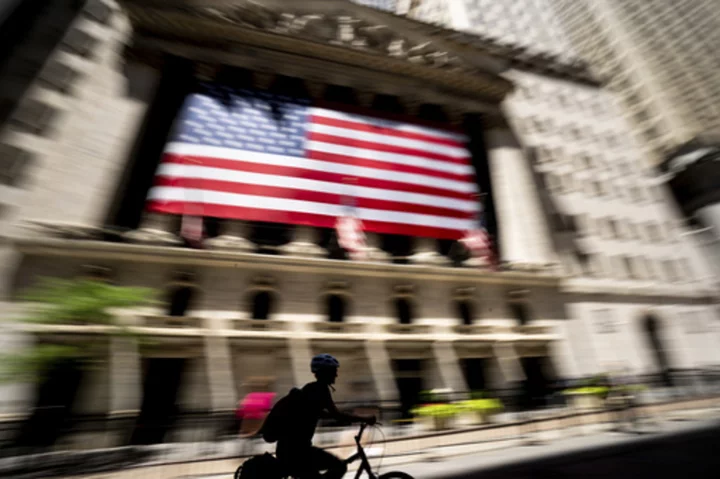Wall Street declined early Friday, threatening a fourth straight day of losses as higher bond yields put pressure on stocks and raised expectations that interest rates would remain elevated.
Futures for the Dow Jones industrials slipped 0.5% before the bell and the S&P 500 gave up nearly 0.6%.
Stocks broadly have retreated in August following a blistering first seven months of the year as a swift rise in bond yields is forcing a reassessment of how stocks should be valued.
The technology sector, which had been leading the way so far in 2023, is now mired in a slump. A handful of companies including Meta, Apple, Microsoft and Nvidia, part of the so-called “Magnificent Seven” have entered correction territory, falling 10% or more from recent highs. They all down slid between 1% and 2% early Friday.
Tesla, also part of that group, has tumbled more than 20% from its recent high, is now in bear territory.
Though the yield on the 10-year-Treasury came back down by early Friday — to 4.22% from 4.32% Thursday morning — it's been threatening to eclipse levels unseen in more than 15 years. The 10-year Treasury was yielding less than 0.70% three years ago.
If it reaches 4.34%, it will be the highest since 2007, according to Tradeweb. That was before the financial crisis and Great Recession caused yields to collapse to record lows.
Higher yields are good for bond investors, who get fatter payouts for their investments. But it hurts stock prices because investors are suddenly less inclined to pay high prices for investments that aren’t as steady as bonds.
Higher yields also mean borrowers have to pay more to get cash, which can crimp corporate profits and cause unforeseen things to break in the system, like the three high-profile U.S. bank failures that shook markets this spring.
Yields have been on the rise as more reports show the U.S. economy remains remarkably resilient. On the upside for markets, the data mean the economy has been able to avoid a long-predicted recession. But on the downside, it could also keep upward pressure on inflation. That would give the Federal Reserve reason to keep interest rates higher for longer.
Traders had also been hoping the Fed would begin cutting rates early next year. Such a move would be a relief for markets because high rates work to lower inflation by slowing the entire economy and hurting prices for investments.
At midday in Europe, France's CAC 40 declined 1.1%, while Germany's DAX and Britain's FTSE 100 each shed 1%.
Japan's Nikkei 225 slipped 0.6% to finish at 31,450.76. Australia's S&P/ASX 200 was virtually unchanged, inching up less than 0.1% to 7,148.10. South Korea's Kospi shed 0.6% to 2,504.50. Hong Kong's Hang Seng dropped 2.1% to 17,950.85, while the Shanghai Composite edged down 1.0% to 3,131.95.
Also on investors' minds is what appears to be China's shaky recovery from the negative economic effects of the coronavirus pandemic.
“In terms of China, there has been very little cause for optimism due to the dire macro indicators, a plunging yuan and property developers hitting troubled waters,” said Tim Waterer, chief market analyst at KCM Trade.
Evergrande Groupe, the giant Chinese real estate developer, says it is asking a U.S. court to approve a restructuring plan for foreign bondholders and denied news reports suggesting it filed for bankruptcy. Evergrande Groupe’s $340 billion in debt prompted fears in 2021 of a possible default that might send shockwaves through the global financial system.
In energy trading on Friday, benchmark U.S. crude lost 44 cents to $79.95 a barrel. Brent crude, the international standard, gave back 50 cents to $83.62 a barrel.
In currency trading, the U.S. dollar edged down to 145.70 yen from 145.83 yen. The euro cost $1.0846, down from $1.0873.
Bitcoin continued its slide Friday, falling another 5% in premarket to $26,455, and is now down close to 10% in the past couple days. The original cryptocurrency had been holding steady right around $30,000 for the past two months.
On Thursday, the S&P 500 lost 0.8%, with August on track to be its worst month of the year by far. The also fell 0.8% and the Nasdaq composite gave back 1.2%.
——
Kageyama reported from Tokyo; Ott reported from Silver Spring, Md.









